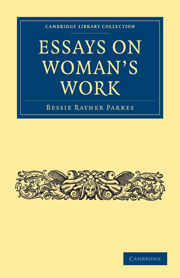IX - MEANS OF EDUCATION
Published online by Cambridge University Press: 05 July 2011
Summary
THE means of education furnished to women of the upper classes have, for the most part, been of a strictly private nature, but it would be, in my judgment, wrong to infer that they have been therefore less efficient for their purpose. Wherever European society has attained to ease and luxury, much pains have been taken with the education of daughters; stress is often laid upon the learned women of the middle ages, but the last century furnishes us with abundance of French and English memoirs, showing that, if less proficient in the classical languages, yet that the average of general culture among ladies of the upper class was a fair one. Their letters furnish us with incontestable proof. A curious example of this is found in the volumes recently published in France upon Marie Antoinette, which give a complete denial to the assertion of a well-known English writer, that Marie Theresa was too much occupied with affairs of state to attend properly to the education of her children; also that the young Dauphine on her arrival in France spoke “imperfect French.” We now possess the original correspondence between Marie Antoinette and her sister Christine; the letters are written in French, which was the family language. She recalls her “tutor, the Abbé Metastasio,” whom she says she liked better than all her other masters; and one of her reasons for loving the Princesse de Lamballe was that she was an Italian, and spoke the sweet language of Italy to her.
- Type
- Chapter
- Information
- Essays on Woman's Work , pp. 195 - 212Publisher: Cambridge University PressPrint publication year: 2010First published in: 1865

